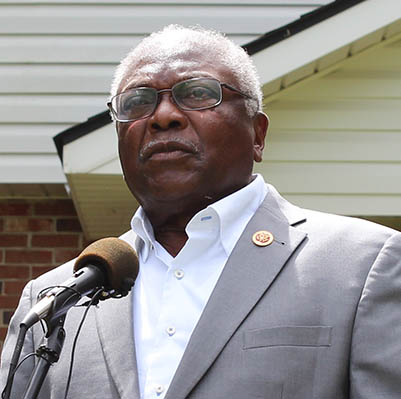 Rep. James Clyburn is one of the most powerful lawmakers in Congress, but he has never forgotten the rural communities he serves as he’s worked to ease their hardships for nearly 50 years, electric cooperative leaders say.
Rep. James Clyburn is one of the most powerful lawmakers in Congress, but he has never forgotten the rural communities he serves as he’s worked to ease their hardships for nearly 50 years, electric cooperative leaders say.
“Congressman Clyburn’s long-standing commitment to the rural citizens of South Carolina and his ongoing partnership with electric cooperatives has been invaluable to our mission of improving the quality of life of our members,” says Mike Couick, CEO of the Electric Cooperatives of South Carolina.
That commitment goes back to the early 1970s, long before the Democratic leader was elected to Congress in 1992.
“Decades before he became a member of Congress, James Clyburn was a great friend to the cooperatives and their members,” Couick says. “In his roles with the Commission for Farm Workers and as an adviser to Gov. John West in the 1970s, he worked with cooperatives so that people in the rural areas of South Carolina were not left behind.”
Couick says Clyburn’s work with the late governor led to a program called “John’s Johns,” which brought bathrooms to rural areas that still relied on outhouses in the early 1970s. The self-contained units included a bathtub, toilet, sink, water heater and overhead heater that could be easily attached to an existing home with simple plumbing and electrical work.
[image-caption title="Rep.%20Clyburn%20speaks%20at%20the%20kickoff%20of%20the%20Electric%20Cooperatives%20of%20South%20Carolina%E2%80%99s%20%E2%80%9CHelp%20My%20House%E2%80%9D%20weatherization%20program." description="%20" image="%2Fremagazine%2Farticles%2FPublishingImages%2FRESP_Clyburn%20speaks4.jpg" /]
Five decades later, Clyburn is the third-highest-ranking member of the U.S. House as majority whip.
While his national influence has grown exponentially over the years, Clyburn’s dedication to local co-op members has remained strong, fighting for things like energy-efficient homes and access to high-speed internet.
“For some, the pandemic exposed the lack of broadband access to rural communities,” Couick says. “However, this has been an issue that Congressman Clyburn has been advocating for years.”
In March, Clyburn joined Sen. Amy Klobuchar, D-Minn., to introduce the Accessible, Affordable Internet for All Act, which would invest more than $94 billion to build broadband infrastructure in unserved and underserved communities.
[section separator="true"]
[section-item 6]
[row]
[column 12]
NRECA CEO Jim Matheson says the legislation “carries the promise of accelerating [co-op] efforts and expanding broadband access across rural America.”
Clyburn says broadband is as important to rural communities today as electricity was in the 1940s.
[/column]
[/row]
[/section-item]
[section-item 6]
[row]
[column 12]
[image-caption title="Rep.%20Clyburn%20with%20NRECA%20CEO%20Jim%20Matheson" description="%20" image="%2Fremagazine%2Farticles%2FPublishingImages%2FClyburn__Scott_Matheson_01.jpg" /]
[/column]
[/row]
[/section-item]
[/section]
"Just as the Great Depression made clear to all that electricity was the ‘next greatest thing’ in the 20th century,” he says, “the coronavirus pandemic is making clear to all that broadband is the ‘next, next greatest thing’ in the 21st century.
“I am thankful to the electric cooperatives that have committed to building high-speed fiber internet networks,” he adds. “This type of commitment brings us one step closer to high-speed internet for all, allowing all Americans to telework, learn remotely or access telehealth services.”
Clyburn has served in congressional leadership from the start. He was elected co-president of his freshman class in 1993 and went on to become chairman of the Congressional Black Caucus and chairman of the House Democratic Caucus before rising to majority whip.
The 80-year-old congressman was born in Sumter, South Carolina, and graduated from South Carolina State College, where he met his late wife, Emily. They were married for 58 years and have three daughters and four grandchildren.
